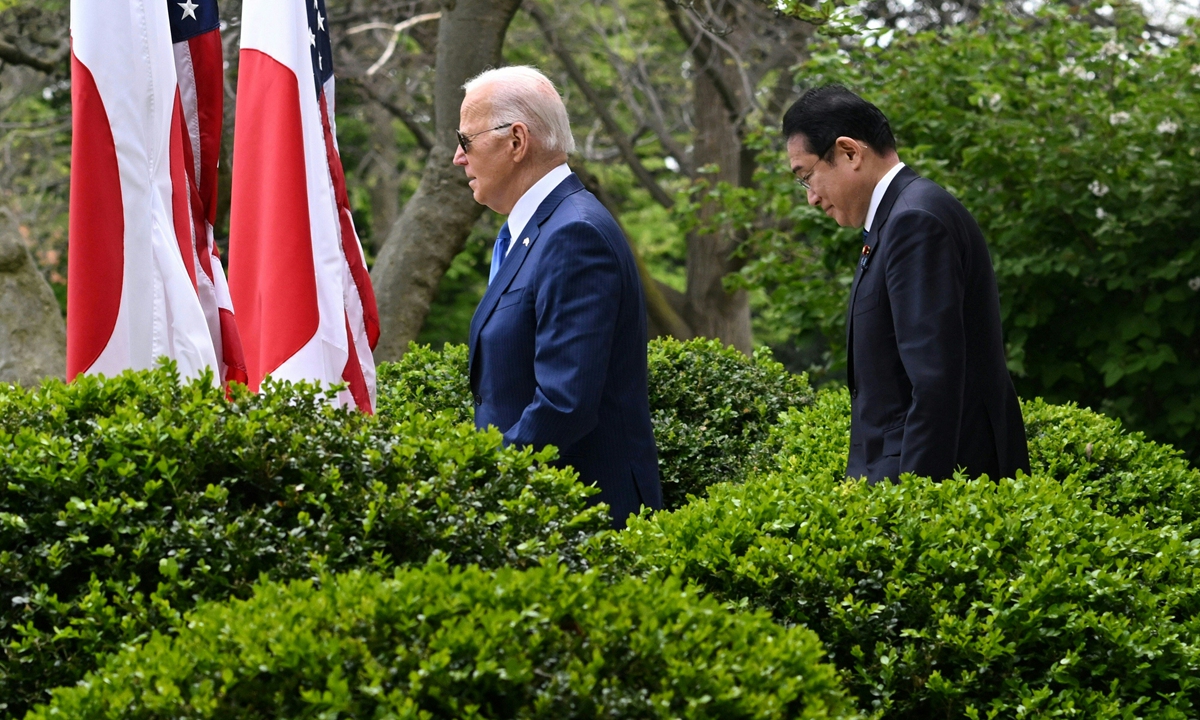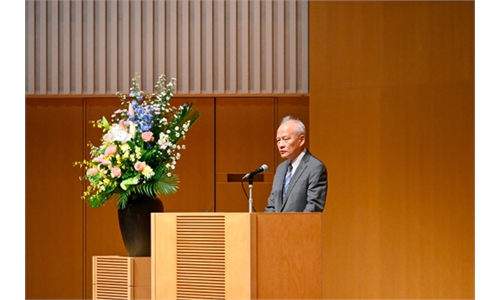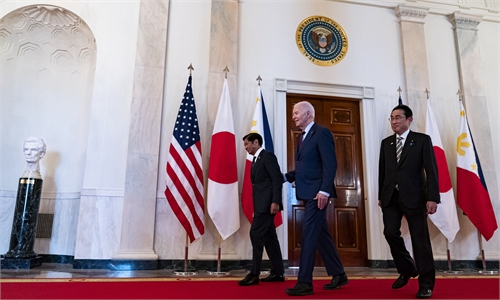Japan's diplomacy document exposes 'opportunistic, double-dealing motives' in its China policy

US President Joe Biden (left) and Japanese Prime Minister Fumio Kishida arrive to speak at a joint press conference in the Rose Garden of the White House in Washington, DC, April 10, 2024. Photo: AFP
In its latest foreign policy report, Japan is following the cliché of smears against China by playing up the so-called China threat and interfering in China's internal affairs, yet at the same time, it restored language that states it needs "strategic and mutually beneficial relations with China." Analysts said this exposes the country's opportunistic and double-dealing motives in its China policy.
In a joint statement in 2008, China and Japan agreed to promote a strategic relationship of mutual benefit in an all-round way. In November 2023, two heads of state reaffirmed the positioning of comprehensively advancing the strategic and mutually beneficial relations at their meeting in San Francisco.
However, in recent years, Japan appears to have abandoned the consensus reached with China and intensified China-bashing language in its defense, diplomacy and other official documents.
According to Kyodo News on Tuesday, the 2024 Diplomatic Bluebook said Japan will promote a "mutually beneficial relationship based on common strategic interests" with China, using wording last seen in the 2019 report, although still claimed its neighboring country poses "an unprecedented and the greatest strategic challenge."
The report mentions "serious concerns" over China's "attempts to unilaterally alter the status quo" and "a series of dangerous acts" in the South China Sea as well as the importance of accelerating trilateral collaboration among the US, Japan, and the Philippines to deal with them, Kyodo News reported.
In response, Lin Jian, a spokesperson for the Chinese Foreign Ministry, said at a Tuesday press briefing that China is firmly opposed to the Japanese document which has followed the cliché of smears and accusations against China, hyped the so-called China threat and interfered in China's internal affairs unreasonably.
We urge the Japanese side to correct its wrong actions, stop provoking and creating bloc confrontation, truly position the strategic and mutually beneficial relations with China as a guideline for the development of bilateral ties, and make unremitting efforts to build constructive and stable China-Japan relations that meet the requirements of the new era, Lin said.
The two Asian neighbors remain at odds over various issues with Japan intensifying its efforts in joining the US to contain China.
Japanese Prime Minister Fumio Kishida has just returned from a high-profile trip to the US, where he tried to show diplomatic results by emphasizing "strengthening the US-Japan alliance."
"During his visit to the US, the prime minister's face was filled with a smile never seen in Japan," Japan's Asahi Shimbun reported on Tuesday.
The report noted that it is undeniable that with the infinite deepening of the integration process between Japan and the US, Japan will undoubtedly be more firmly integrated into the strategy of the US to contain China.
"Does Kishida's rarely seen smile in the US really herald a new level of cooperation between the US-Japan alliance?" questioned Da Zhigang, director of the Institute of Northeast Asian Studies at the Heilongjiang Provincial Academy of Social Sciences.
The expert noted that even as China and the US are in competition in multiple aspects, US Secretary of the Treasury Janet Yellen and US Assistant Secretary of State for East Asian and Pacific Affairs Daniel Kritenbrink have visited China in succession, therefore there has been significantly more high-level communication between China and the US than between China and Japan.
According to Da, the political elite and economic circles in Washington must have a consensus - the level of engagement of US-Japan relations cannot be compared with that of China-US relations. In this context, the first risk Japan faces is whether it can bear the consequences of blindly following the US' inducement to "de-risk" or "decouple" with China. The second risk is that Japan's participation in the US strategy to contain China will inevitably provoke geopolitical instability, which is not desirable for countries that desire peace. As an Asian country, it is uncertain whether Japan can cope with the tension with its neighbors.




